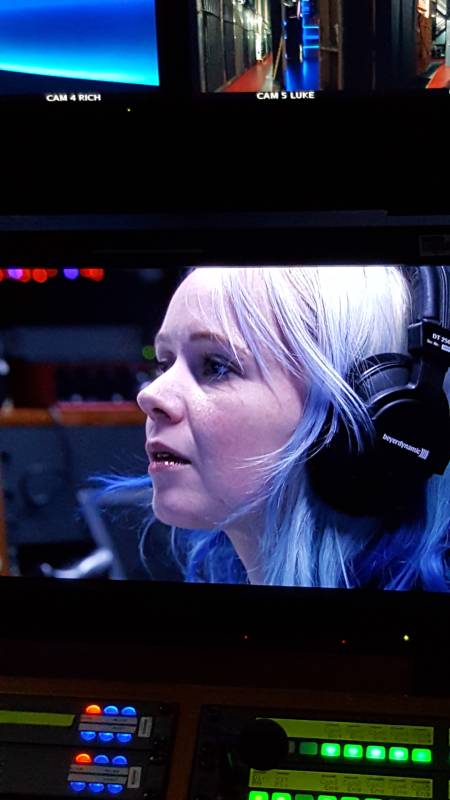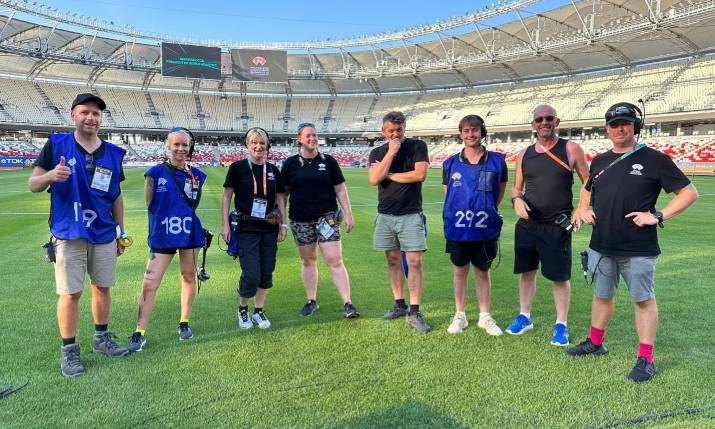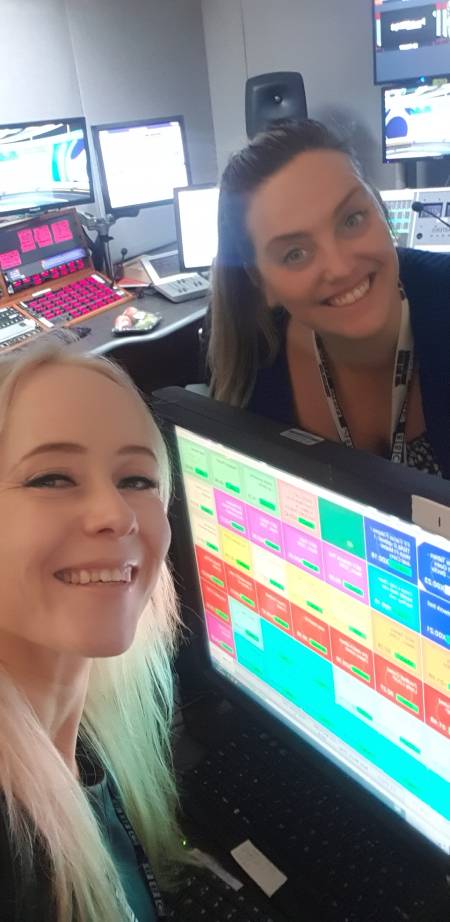In the mix: Andria Sjøberg, freelance broadcast sound engineer on her love of making audio for live sport

Working in grams in a studio, freelance broadcast sound engineer, Andria Sjøberg
“Since moving into live sport I really found it’s my absolute favourite area to work in out of everything I’ve done over the years,” says Andria Sjøberg, freelance broadcast sound engineer. “I like the fast-paced nature and that every job presents new and different challenges from working in football, to motorsport, athletics and even indoor bowls. There are always different client requirements and different elements to the job to suit the nature of the sport. Sometimes a challenge can present itself that you can solve from using something you did on a completely different job.”
For Sjøberg, working in broadcasting was an obvious career choice. She explains: “It was always in the family! My dad worked in TV as a spark – mostly dramas and studio – and I grew up with it. I consciously tried to avoid getting into TV for several years, but finally realised I was interested in how it worked and come together and wanted to get involved much to his delight! So I already knew about the long unsociable hours, the toll it can take on a family and that it can take you all over the world. I moved into sports broadcasting much later, but I’m so glad I found it.”
Apprentice in sound
Her first job in TV was at ITV at Granada as an apprentice in sound. She says: “I worked in studios and also on Coronation Street, learning studio rigs, mic placement, progressing onto being a gram op, how to boom op and I also learned how to use a fisher boom.
“There was lots to learn and with the old analogue Calrec desks and patch bays, problem solving was always fun! Out of all of the technical departments, sound are the ones getting in the personal spaces of presenters and contributors, so being able to be mindful and discreet is essential. Coronation Street was a completely different style of sound and I got to learn a lot about negotiating with different departments to get the shot and sound we all wanted.”
After having children, Sjøberg took some time off work and eventually came back as a freelance sound engineer. She signed up with a crewing company in 2019 which introduced her to the world of sport.
She says sports broadcasting is now her passion: “Sport wasn’t something I had got to experience as a staffer at ITV and honestly, I really wish I’d got to do it years earlier. I enjoy doing sound in general, but doing sound for sport is something I absolutely love. I enjoy going to different venues around the country and further afield. It’s a new challenge every time and the crew and kit is different every day; there’s always something new to learn!
“Post-COVID, I took a staff job mixing BBC Sports news at Quay House, but I missed working in live sport and I came back into it, but that job did help me become a better mixer and understanding incoming feeds from events around the world.”
Sjøberg went straight from school to doing an ND at St Helens College, Merseyside, Liverpool in Music Technology. Sjøberg says: “I loved sound and wanted to go down a less academic route to learning as I felt A-Levels and exams didn’t really work for me. I progressed onto an HND at Salford University, Manchester in Professional Sound and Video, but left after a semester.
“I then went to University of Huddersfield the following year to do the Music Technology and Audio Systems course. I took a year in industry at a local PA company and learned how to mix FOH/monitors for bands. I carried on working with them for around three years in total. In 2006 I became a sound apprentice at ITV in what was then 3sixtymedia.”

Freelance broadcast sound engineer, Andria Sjøberg [second from left] at the 2023 World Athletics Championships in Budapest, Hungary

Andria Sjøberg [left] and Heather Winn working together in Dock10
Sjøberg says of being a freelancer sound engineer that it suits her interests as well as her lifestyle: “Currently, I’m freelance. I assist on OBs, gram op and occasionally supervise on more news-based programming. I also do a bit of comms too. I’m a single parent and freelance life does work well for family life. Taking a staff job again is something I would definitely do, but it would have to be with the right company.”
However, she adds: “I found getting back into work after having a few years break to have the kids was hard. In the time I was away, Granada closed and MediaCityUK had opened and I did feel like I missed the boat a bit with regards to that. I think if you take time away, you need to find ways to stay in touch and keep your face known and remembered.”
On her favourite gig in sound, Sjøberg comments: “I love working on Wimbledon for NEP which I’ve done for the past couple of years, and I’m fortunate enough to get to be part of the rig, which out of all parts of my job is my favourite thing to do.
“It’s such a huge infrastructure with different elements to it and there’s always new things to do, from building mic arrays for the in court FX, to chasing fibre in the basement,” she adds on Wimbledon. “I’ve had the opportunity to do a little mixing of a couple of the outside courts and hopefully can do some more this year to build on that. Eurovision last year came a close second!”
There are many reasons to enjoy the job, she states, including the challenges that this industry’s rapidly changing technologies throw up: “There are new challenges every day, whether its meaning you have to get creative to find somewhere to place a microphone or find a technical solution to a problem.
“I think keeping up with technologies and changing environments are the main challenges. Since COVID, more and more OBs are going remote, which creates new ways of working. I’m trying to learn more about IP and networking; luckily I had a couple of modules covering the basics back at uni, so I had a base knowledge already. I’ve bought myself a set of Cisco switches and routers with the aim to work through the CCNA course.
“Obviously IP has changed ways of working and will be an important part of broadcasting in the future,” continues Sjøberg. “But my favourite thing recently is to use [Reidel] Boleros for the presenters on the Isle of Man TT. They can have their normal feeds in their ears, but also as it’s so noisy, we have a separate listen-only partyline for the FM to speak to them as they split up and it’s much easier to herd them to the correct place without interrupting the gallery.”
As to advice Sjøberg offers to other sound engineers out there, she says: “Get yourself a good fibre meter, cable tester, light pen and lots of tape! OB rigging and derigging can get dirty so a decent set of gloves is a must too.”
She concludes: “OBs can still feel like a male dominated environment, but it’s certainly a positive environment where women can thrive and develop. If you’re new to sound, then try for a traineeship at one of the OB companies, you’ll learn so much and stay there as long as you can to get out of it as much as you can. Once you become freelance, the learning is so much more difficult to do as you’re expected to already know equipment, etc. Being staff gives you the time to be able to learn.”

